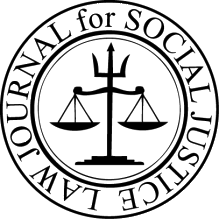Application Process
Like all law journals at ASU, LJSJ selects members through the school-wide Write-On competition that takes place after spring finals. Rising 2Ls, 3Ls, and transfer students are eligible to apply to LJSJ through the Write-On competition. Additionally, LJSJ considers transfer candidates throughout the school year. Transfer candidates may email the Editor-in-Chief for more information.
Consistent with our mission of fostering important conversations surrounding social justice, LJSJ prioritizes applicants’ statements of interest in our grading process. Statements of interest should demonstrate a sincere interest in social justice issues. In Spring 2021, application materials were given the following weight:*
- Memo: 15%
- Bluebook: 20%
- GPA: 10%
- Resume: 25%
- Statement of Interest: 30%
*Exact percentages are subject to change. Updated percentages will be emailed directly to applicants via the ASU Write-On Committee. Per LJSJ bylaws, statements of interest will always be prioritized in grading.
Transfer and Hardship Petitions
Students entering their second year who transfer from another school, or who, for exceptional reasons,* were unable to participate in the Write-On Competition may petition the LJSJ Board for Law Journal for Social Justice membership no later than two weeks before the fall Orientation. The LJSJ Board may approve or deny the request, or it may request a writing sample and other materials from the student before acting on the special petition. This approval may be conducted via the informal board vote procedures detailed in these bylaws. Each application will be reviewed by three (3) Law Journal for Social Justice members. If the applications are submitted after regular Write-On offers have been extended and the applicant’s score is greater than or equal to the lowest scored member that was offered a regular Write-On acceptance, the transfer or hardship applicant will be extended an offer to join the Law Journal for Social Justice.
- 10% = 10-page Legal Writing Memo
- 30% = Resume
- 10% = Cumulative GPA
- 50% = Personal Statement
Each petition for membership must be accompanied by a release that permits the Board to review the petitioner’s academic records on file at the ASU College of Law.
*Students who choose to petition due to exceptional circumstances must, in their petition, demonstrate that they were properly registered to participate in the Write-on Competition but were ultimately unable to compete due to unforeseen circumstances.
About Membership with LJSJ
LJSJ seeks members who believe in our mission of fostering important conversations involving timely social justice issues. In alignment with this mission, LJSJ shares diverse voices and perspectives to promote a deeper understanding of the complex social justice issues in our society, both through our members’ blog posts and our full-length publications. Our requirements enable students to dedicate time to issues they are passionate about while still supporting scholarship that furthers social justice movements.
New Member Responsibilities and Opportunities
During a member’s first year as an Associate Editor, they have the following responsibilities:
- Cite Checks: Associate Editors, under the direction of 3L Articles Editors, are responsible for reviewing the articles that the Managing Editor and Executive Board have selected for publication. Associate Editors check each article for correct Bluebook citation format, grammatical issues, and stylistic concerns. Cite check turnaround is approximately two weeks per batch. The size of each batch of cite checks varies, but last year they typically included 30-40 footnote citations. Depending on LJSJ’s publication schedule, cite checks may finish anywhere from 1/2 -3/4 of the way through each semester. There are no cite checks over winter or summer break.
- Blog Posts: Associate Editors write one blog post per academic semester about a social justice issue. Blog posts are a minimum of 500 words but can be longer. Each Associate Editor’s blog is reviewed by their Articles Editor, returned for adjustments, and then submitted to the Online Media Editor, who publishes the blog on our website. There are no blog deadlines over winter or summer break.
- Attend LJSJ’s Symposium: LJSJ also hosts a yearly symposium with guest speakers that focuses on a timely social justice issue. 2021’s symposium was on Climate Migration. Associate Editors are invited to assist with the Symposium and all journal members are required to attend.
- Notes/Comments: There are no note or comment requirements. LJSJ members may write their Graduate Writing Requirement through LJSJ if they choose to.
Future Opportunities
3L members have the opportunity to serve as Editor-in-Chief, Managing Editor, Senior Articles Editor, Symposium Chair, Online Media Editor, Director of Business and External Affairs, or in one of LJSJ’s Articles Editor roles. Many 3L members also choose to continue working as Associate Editors.
Additionally, in 2020-2021, LJSJ’s Director of Business & External Affairs created a position for an LJSJ member to be a paid researcher with ASU’s Academy for Justice. This position was open to all members. We hope to continue this relationship in subsequent summers.
Support for Members
Articles Editors provide instructions and feedback on Associate Editors’ citation checks and blogs. They are always accessible for any questions or concerns an Associated Editor might have about cites, Bluebook rules, or an article’s content. During the fall semester, Articles Editors may also provide office hours for cite check questions. Additionally, all members attend an orientation at the beginning of each school year.
LJSJ’s Culture
LJSJ knows that our commitment to social justice must also include compassion, fairness, and joy in our relationships with each other. We derive strength from our members’ and authors’ lived experiences and interests. To this end, our members’ interests and strengths vary—LJSJ has member-experts in environmental activism, disability rights, mental healthcare, Native American and Indigenous rights, anti-racism and decolonization work, workers’ campaigns, LGBTQ+ rights, immigrant rights, and more. Further, we underscore our commitment to social justice with reasonable cite check deadlines, a manageable “mandatory” workload, and options for deeper participation.
Your work on LJSJ can shape our legal and cultural landscape. Contact our Editor-in-Chief to learn more!
